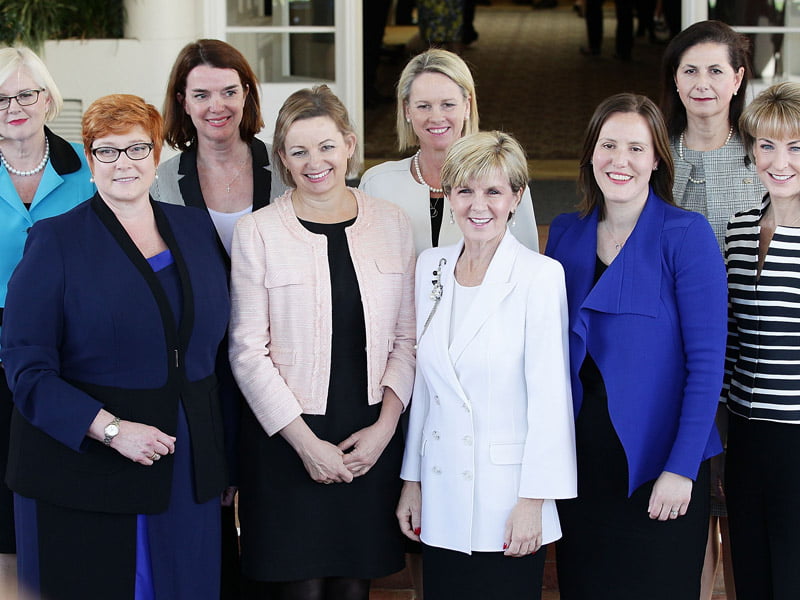The appointment of five women to Malcolm Turnbull’s Cabinet should send a strong signal about diversity to the tech sector.
Besides retaining the highly regarded Julie Bishop as Deputy PM and Foreign Affairs Minister, and Sussan Ley as Minister for Health and Minister for Sport, Turnbull has delivered Defence to Senator Marise Payne; Senator Michaelia Cash becomes Minister for Employment, Minister for Women and Minister Assisting the PM for Public Services; while Kelly O’Dwyer has been named Minister for Small Business and Assistant Treasurer.

As a vocal supporter of Australia’s five-year old Male Champions for Change initiative, Turnbull’s decision to appoint more women to senior Cabinet roles had been widely anticipated.
And these are significant rather than decorative appointments.
Payne is widely perceived as a strong performer who has got things done during two years at Human Services which is undergoing a technology transformation programme.
She will be Australia’s first female Defence Minister, with oversight of the looming defence review and politically charged submarine programme.
O’Dwyer, a previous advisor to Peter Costello, well understands the nuanced difference between a start up and a small business. She will also have to grapple with the introduction of GST to online purchases, a “Google tax” intended to put the squeeze on companies using internal transfer pricing arrangements to shift profits to low taxing jurisdictions, and the introduction of a crowdsourcing framework. O’Dwyer is the first woman to reach this level in a Treasury role.
Meanwhile with Cash’s appointment Australia finally has a female Minister for Women, but there’s a certain irony – at least for the tech sector – that a woman is now Minister for Employment.
In a blog post in July, Turnbull wrote; “Increasing the number of women in politics is not solely a ‘women’s issue’ – it is in the national interest for Australia to have access to 100 per cent of the nation’s talent pool, regardless of gender.”
Replace the word “politics” with “tech sector” and the argument is equally valid.
Speaking last month at a Women in VCE event, Australia’s Human Rights Commissioner, Professor Gillian Triggs, referencing the fact that only one in eight undergraduate ICT students is female, said that the fact that women aren’t more involved in technology related roles was “horrifying”.
Triggs is no fan of quotas, but she is fond of targets that organisations and individuals can strive for and measure themselves against. She suggested that a target of 30 per cent female participation in the IT sector by 2020 was a reasonable aim – though it still seems on the low side.
In establishing his “21st Century Government” Turnbull now has five women in a cabinet of 21 – almost 24 per cent representation. It’s pretty much line ball with the tech sector.
According to the most recent Australia’s Digital Pulse, a report prepared by Deloitte for the Australian Computer Society, 43 per cent of professional industry roles are held by women. In technology the figure is a much lower 28 per cent.
It’s not just participation that needs addressing, there is already a nasty gender pay gap which is actually growing in the technology sector. The Australian Workplace Gender Equality Agency’s August 2015 report noted that a woman working in the information, media and telecommunications sector would have to work 65 days longer than a man to achieve the same annual salary.
In May 2014 the gender pay gap in the sector was 19.15 per cent and by May this year that had swollen to 21.3 per cent. Meanwhile fewer than a third of companies in the sector had any form of gender pay gap analysis in place, let alone a programme to address the imbalance.
Change is overdue.
Melissa Widner, venture partner at OneVenture and co founder and executive board member of Heads Over Heels, which seeks to lift women’s participation in Australian enterprise, said that she is optimistic that the dial is now set for an improvement in terms of gender equity.
An American, married to Andrew Dent, CTO of Sydney based start-up Zeetings, Widner said that although the absolute number of women in technology and positions of executive power in Australia is roughly equivalent to the situation in the US, she believes that the dialogue about gender is further advanced in Australia, particularly thanks to the Male Champions of Change initiative.
With the Turnbull appointments; “We are now getting back to where we were. Hopefully some day it won’t be news that someone has appointed five women, and if it is it will be to ask why only five?” she said.
Do you know more? Contact James Riley via Email.

